2018高二英语外研版选修六教学案:module 1 section 3 含答案
- 格式:doc
- 大小:135.00 KB
- 文档页数:9
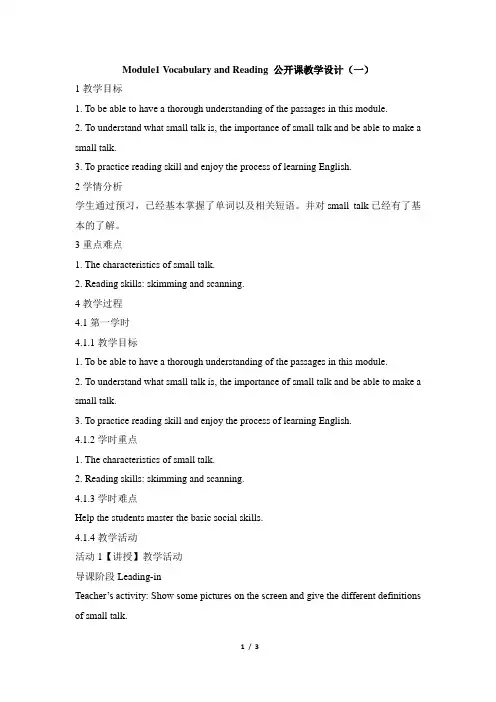
Module1 Vocabulary and Reading 公开课教学设计(一)1教学目标1. To be able to have a thorough understanding of the passages in this module.2. To understand what small talk is, the importance of small talk and be able to make a small talk.3. To practice reading skill and enjoy the process of learning English.2学情分析学生通过预习,已经基本掌握了单词以及相关短语。
并对small talk已经有了基本的了解。
3重点难点1. The characteristics of small talk.2. Reading skills: skimming and scanning.4教学过程4.1第一学时4.1.1教学目标1. To be able to have a thorough understanding of the passages in this module.2. To understand what small talk is, the importance of small talk and be able to make a small talk.3. To practice reading skill and enjoy the process of learning English.4.1.2学时重点1. The characteristics of small talk.2. Reading skills: skimming and scanning.4.1.3学时难点Help the students master the basic social skills.4.1.4教学活动活动1【讲授】教学活动导课阶段Leading-inTeacher’s activity: Show some pictures on the screen and give the different definitions of small talk.Students’ activity:Discuss who make, and where and why people make small talk. 授课阶段:教学内容(一)PresentationTeacher’s activity 1: V ocabulary test.Students’ activity 1: Speak out the meaning of the vocabulary.Teacher’s activity 2: Hand out the answer sheet.Students’ activity 2: Check the answers of assignment.Teacher’s activity 3: Explain the difficult questions.Students’ activity 3: Try to polish the sentences on the screen.教学内容(二)PresentationTeacher’s activity 1: Show Ss the requirements of crazy Engli sh.Students’ activity 1: Recite the phrases.Teacher’s activity 2: Test.Students’ activity 2: Play a game.Teacher’s activity 3: Assign the Ss to read the article and discuss the questions with their partners.Students’ activity 3: Read the article and discuss the questions group.评学阶段Teacher’s activity : Require Ss to write a short conversation to give Esther some suggestions on how to give small talk.Students’ activity: Give some suggestions to Esther and polish them, then present to others.课后作业Finish the conversation in full length.4.2第二学时4.2.1教学目标1. To be able to have a thorough understanding of the passages in this module.2. To understand what small talk is, the importance of small talk and be able to make a small talk.3. To practice reading skill and enjoy the process of learning English.4.2.2学时重点1.Help the students master the important phrases and sentence pattern.2.Help the students master the basic reading skills.4.2.3学时难点1. Phrases and sentence pattern.4.2.4教学活动。
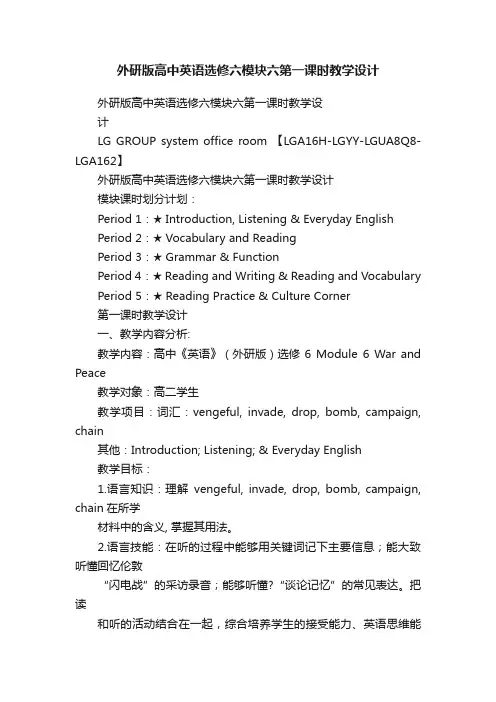
外研版高中英语选修六模块六第一课时教学设计外研版高中英语选修六模块六第一课时教学设计LG GROUP system office room 【LGA16H-LGYY-LGUA8Q8-LGA162】外研版高中英语选修六模块六第一课时教学设计模块课时划分计划:Period 1:★ Introduction, Listening & Everyday EnglishPeriod 2:★ Vocabulary and ReadingPeriod 3:★ Grammar & FunctionPeriod 4:★ Reading and Writing & Reading and Vocabulary Period 5:★ Reading Practice & Culture Corner第一课时教学设计一、教学内容分析:教学内容:高中《英语》(外研版)选修6 Module 6 War and Peace教学对象:高二学生教学项目:词汇:vengeful, invade, drop, bomb, campaign, chain其他:Introduction; Listening; & Everyday English教学目标:1.语言知识:理解vengeful, invade, drop, bomb, campaign, chain在所学材料中的含义, 掌握其用法。
2.语言技能:在听的过程中能够用关键词记下主要信息;能大致听懂回忆伦敦“闪电战”的采访录音;能够听懂?“谈论记忆”的常见表达。
把读和听的活动结合在一起,综合培养学生的接受能力、英语思维能力?和联想能力。
3.语言运用:说出与“战争与和平”有关的词汇、短语(越多越好),口头简介第二次世界大战,陈述自己对于战争的看法和观点。
4.文化意识:了解第二次世界大战和伦敦“闪电战”的情况。
5.情感态度:维护人类正义,珍爱世界和平。
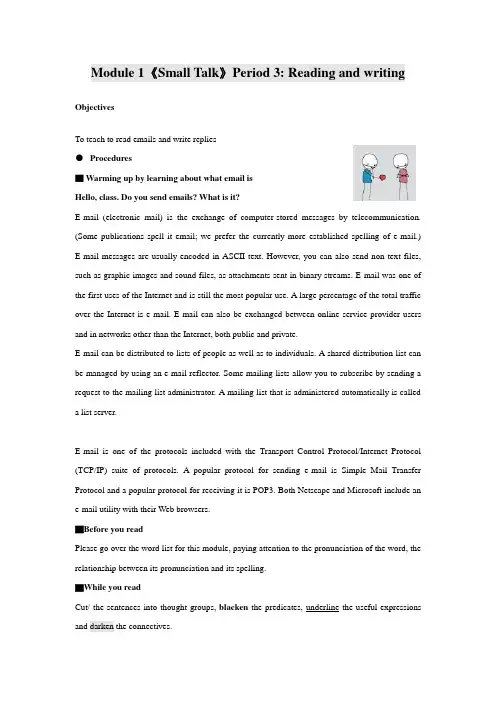
Module 1《Small Talk》Period 3: Reading and writing ObjectivesTo teach to read emails and write replies●Procedures▇ Warming up by learning about what email isHello, class. Do you send emails? What is it?E-mail (electronic mail) is the exchange of computer-stored messages by telecommunication. (Some publications spell it email; we prefer the currently more established spelling of e-mail.) E-mail messages are usually encoded in ASCII text. However, you can also send non-text files, such as graphic images and sound files, as attachments sent in binary streams. E-mail was one of the first uses of the Internet and is still the most popular use. A large percentage of the total traffic over the Internet is e-mail. E-mail can also be exchanged between online service provider users and in networks other than the Internet, both public and private.E-mail can be distributed to lists of people as well as to individuals. A shared distribution list can be managed by using an e-mail reflector. Some mailing lists allow you to subscribe by sending a request to the mailing list administrator. A mailing list that is administered automatically is called a list server.E-mail is one of the protocols included with the Transport Control Protocol/Internet Protocol (TCP/IP) suite of protocols. A popular protocol for sending e-mail is Simple Mail Transfer Protocol and a popular protocol for receiving it is POP3. Both Netscape and Microsoft include an e-mail utility with their Web browsers.▇Before you readPlease go over the word list for this module, paying attention to the pronunciation of the word, the relationship between its pronunciation and its spelling.▇While you readCut/ the sentences into thought groups, blacken the predicates, underline the useful expressions and darken the connectives.▇After you readCopy all the useful expressions into your Expression Book and make your own sentences with them.■Writing a reply■Learning about the tips of writing effective emails ■Here are ten tips for writing effective emails.*Write a meaningful subject line.*Keep the message focused and readable.*Avoid attachments.*Identify yourself clearly.*Be kind -- don't flame.*Proofread.*Don't assume privacy.*Distinguish between formal and informal situations. *Respond Promptly.*Show Respect and Restraint.。
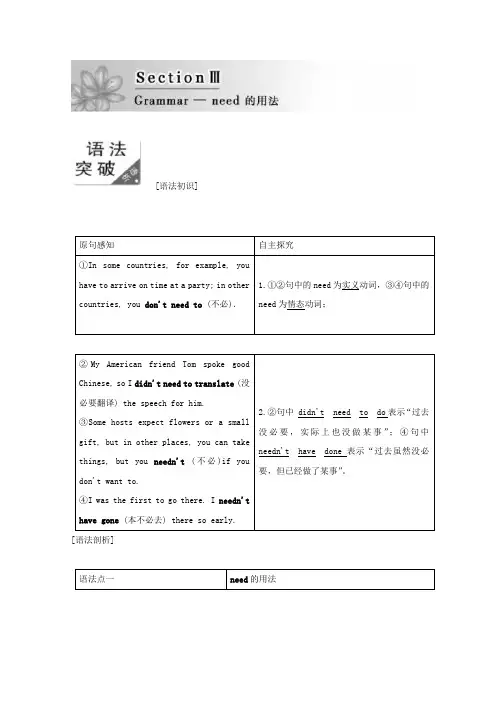
[语法初识][语法剖析]1.用作实义动词(1) 有人称和数的变化,其第三人称单数形式为needs,变为否定句或疑问句时要用助动词do/does/did。
(2)后跟名词、代词、不定式或动名词作宾语,当need的主语与need后面的动词之间是被动关系时,need后面接不定式的被动形式或动名词的主动形式。
You don't need to worry about me.你不必担心我。
The room needs cleaning/to be cleaned, but I only have time on Sunday.房间需要打扫,但是我只有星期天有空。
2.用作情态动词(1)need表示“需要”或“必须”,通常用于否定句和疑问句。
You needn't do it again.你不必再做了。
Need he do his homework first?他需要先做作业吗?(2)由must引起的一般疑问句中,否定答语可用needn't, 意为“没必要”。
—Must I do the work now?—No, you needn't.——我现在必须做这项工作吗?——不,你不必。
(3)在need引起的一般疑问句中,肯定回答用must,否定回答用needn't。
—Need I go there too?—Yes, you must./No, you needn't.——我也需要去那儿吗?——是的,你必须去。
/不,你不必去。
集中演练11-1.单句改错①—I'm sorry I will be very busy tomorrow.—If so, you didn't need to come.didn't need to→needn't②As a result of the serious flood, two thirds of the buildings in the area need repair.repair→repairing/to be repaired③—Must I hand in the paper before Friday?—No, you mustn't.mustn't→needn't④I couldn't use a clock to wake me up every morning because I am always woken up by my mother.couldn't→needn't1-2.完成句子⑤Dr. Smith needed (需要) no payment for his work.⑥We need to (需要) make sure our plan will be well carried out.⑦—Must I answer the question?—No, you needn't (不必).⑧You don't need to (不需要) have the bike repaired right away.⑨The flowers need watering/to be watered (需要浇水) now.⑩Come on, you needn't worry about (不必担心) it because it's not your fault.1.didn't need to do表示“过去没必要做某事,实际上也没做”。
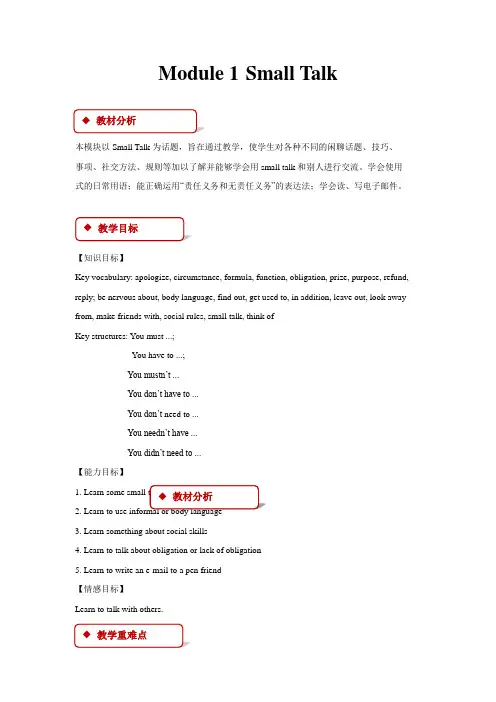
Module 1 Small Talk本模块以Small Talk 为话题,旨在通过教学,使学生对各种不同的闲聊话题、技巧、 事项、社交方法、规则等加以了解并能够学会用small talk 和别人进行交流。
学会使用 式的日常用语;能正确运用“责任义务和无责任义务”的表达法;学会读、写电子邮件。
【知识目标】Key vocabulary: apologize, circumstance, formula, function, obligation, prize, purpose, refund, reply; be nervous about, body language, find out, get used to, in addition, leave out, look away from, make friends with, social rules, small talk, think ofKey structures: You must ...;You have to ...;You mustn’t ...You don’t have to ...You don’t need to ...You needn’t have ...You didn’t need to ...【能力目标】3. Learn something about social skills4. Learn to talk about obligation or lack of obligation5. Learn to write an e-mail to a pen friend【情感目标】Learn to talk with others.【教学重点】Let the students learn to talk about small talk.【教学难点】Learn to make small talk and use the str ucture “didn’t need to do and needn’t have done”.Tape recorder, MultimediaStep 1. Introduction & Reading1. Look at the two pictures and make a dialogue for each one.2. DiscussionLook at these pictures. Have a discussion about where and what they are doing.3. BrainstormRead these words and think about how we use them in a conversation.4. DiscussionDo you think they are small talks?What is a small talk?Can you find the definitions in the dictionaries?Divide the topics into two groups7. DiscussionLook at the chart and talk with your partner about your opinions.Step 2. Vocabulary and reading1. DiscussionLook at the title:2. Read the passage and decide what kind of book it is from.。
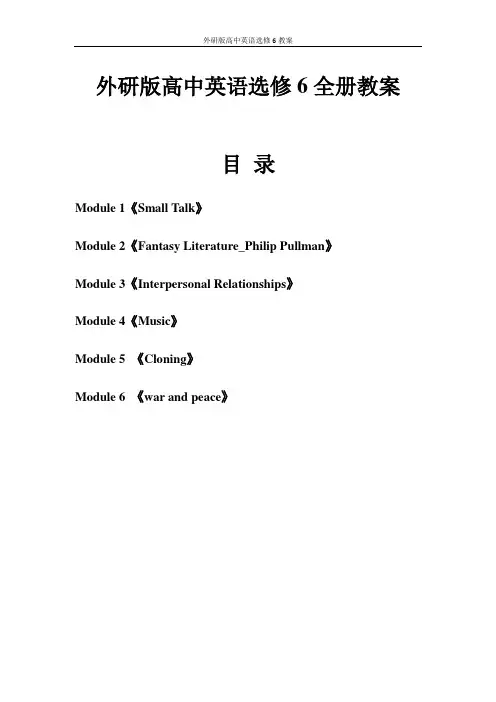
外研版高中英语选修6全册教案目录Module 1《Small Talk》Module 2《Fantasy Literature_Philip Pullman》Module 3《Interpersonal Relationships》Module 4《Music》Module 5 《Cloning》Module 6 《war and peace》Module 1 Small TalkTeaching aims:1. To introduce different social skills about talking in different culture and improve the students’ social skills.2. To know how to talk about obligation or lack of obligation.3. To master AAA talking model and to develop the friendly environment whenhaving talk with others.Important and difficult points:1. Get students to understand how to have a chat with others in English culture.2. Make students know the importance of small talk between persons.3. Help students to improve the cultural understanding skills in different countries.Teaching procedures:Step 1. In this part, the teacher can talk with students in small talk, and the teacher can choose different topic with different students.For example:T: What do you think of yesterday’s football match between your class and Class 3?S1: It’s great.S2: We won.T: Do you know why you won?S3: We are strong.T: Good. When we were discussing the football match just now, we were discussing serious things or having light conversation?Ss: Light conversation.T: Oh, yes. Just small talk.Step 2. After the teacher tell the students small talk, the students begin to read the dictionary definitions of small talk then ask the students to discuss the four questions inActivity1.Step 3. Divide the students into groups of two ones to discuss the five questions in Activity2. Then the teacher can choose some groups of students to show their smalltalk to all the students. The Ss can have different opinions, but they must give the reason for their opinions.Step 4. Make a talk between the Ss and the teacher, then introduce the topic about must, have to, don’t have to and mustn’t.For example:T: You are now in Senior Two, and I think you are all good students, although some of you sometimes behave not very properly. So I’m going to ask you some questions. Do you think students have to be on time at school?Ss: …T: Oh, yes. You are right. You have to. Then say something that you must do.S1: …S2: …T: And anything you mustn’t do?S1: …S2:…Ask the Ss to talk about the following topics:What is obligation?What is lack of obligation?According to the talking method, the teacher can introduce the definitions of obligation and lack of obligation.Step 5. Ask the students to finish Activity1 and then let the Ss to talk about the answers they have made.Ask the Ss to make similar sentences impressing obligation and lack of obligation using the words they just practiced.Step 6. Make a competition among the Ss to make sentences using must, have to, don’t have to, mustn’t, needn’t do and don’t need do. And the team which make sentences will win the competition.Step 1. Ask Ss to discuss the sentences in Activity 1 and then check the answers of the Ss’. Then learn the words in this part with the Ss.Step 2. Ask the Ss to read the text quickly and then finish Activity2. Then ask all the Ss to discuss the questions of Activity 4. Then ask the Ss to tell us the usage of the words in Activity1 and Activity 4 and find the sentences in the text: impress, damage, encourage, prepare, avoid, lack, recognize, smile.Step 3. Ask the students to read the text again, then answer the questions in Activity3 and encourage the Ss to have different answers. If the time isn’t enough, we can solve the problem in the following ways.(1)Discuss it after class.(2)Discuss the following questions as the important points.I.What do people think about those who talk too much?II.Why is it a good idea to nod and smile when the other person is talking?III.What does the quotation from Benjamin Disraeli tell you about people? Then ask the Ss to prepare for Activity5 and then ask the Ss to tell the meanings of the phrases.Step 4. Important word or phrases1. Which definitions make small talk sound like a positive thing?Sound is a link verb,its meaning in Chinese:听起来。
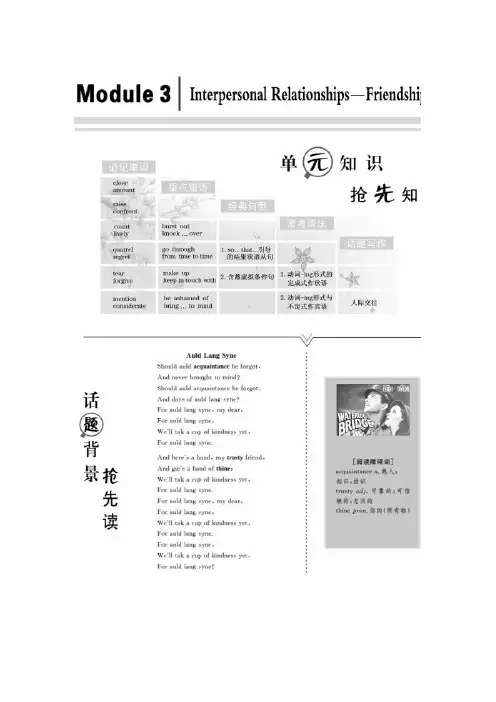
Ⅰ.Match the word with its meaning.1.close A.(使)旋转, (使)摆动2.trust B.筹措(金钱)3.chat C.偷,盗窃4.financially D.喜怒无常的5.moody E.数量6.amount F.亲密的,亲近的7.raise G.信赖,信任8.theft H.闲谈,聊天9.swing I.财政上地10.interpersonal J.人际关系的,人与人之间的答案:1~5 FGHID 6~10 EBCAJⅡ.Write down the meaning of phrases in each sentence.1.Seeing the funny clown appear on the stage, all the audience burst out laughing.突然发生,突然……起来2.The bad man knocked over the old man with the black car. 撞伤,撞死3.By that time I had lost interest in that idea. 对……失去兴趣4.I see him at the library from time to time. 偶尔,有时5.Although the old scientist has finished the difficult experiment, he is still going through the results. 仔细检查6.Turn round and let me look at your back. 转过身来1.What kind of friend do you like?In my opinion, a good friend should be friendly, helpful,polite, generous, honest, loyal, humorous, warmhearted, responsible, patient, brave, selfless and so on.2.Has your friend ever made a foolish mistake, or has he ever hurt you either on purpose or by accident? Do you expect your friend to act like Lian Po, the general of the kingdom of Zhao, who carried a rod on his back and asked for punishment, or do you just think that letting a friend make a mistake is better than taking action that risks destroying a friendship? Read the passage and find out what the writer's friend Roy did and what the writer's reaction was.Ⅰ.Fastreading1.Read the text quickly and finish the following question.What is the main idea of the passage?The passage is about the story of the writer's friend, Roy, who changed from a kind, hardworking and popular student to a problem student involved in theft.2.Read the passage quickly and match the main idea with each part.①Paras.1、2 A.I found Roy stole other students' wallets.②Para. 3 B.I found Roy stole the money raised for a charity by accident.③Paras.4、5 C.I got to know Roy and madefriends with him.④Paras.6~8 D.Unhappy things happened to Roy and he changed completely.答案:①~④ CDABⅡ.CarefulreadingRead the text carefully and choose the best answer.1.What do we know about Daniel's life when he moved to London?A.He was popular.B.He liked telling jokes.C.He was very shy and lonely.D.He had several old friends in his new class.2.Which of the following is TRUE about Roy?A.Roy moved to a larger house a year ago.B.Roy was more hardworking after his father died.C.Roy stole Daniel's money.D.Roy's family led a harder life after his father's death.3.What do we know about the big fair?A.The fair was held for Roy.B.The money from the fair might have been taken away by Roy.C.Roy wasn't present at the fair that day.D.All the people knew it was Roy that stole the money from the fair.4.What can we learn from the passage?A.Roy was dismissed from the class.B.Roy never stole other students' money.C.Mr White scolded Roy seriously.D.Roy needed help with life and schoolwork.答案:1~4 CDBDⅢ.StudyreadingAnalyze the following difficult sentences in the text.1.Roy, who had always been very close to his father, changed completely, becoming silent and moody.[句式分析][尝试翻译] 罗伊原来和他父亲关系十分亲密,而父亲去世后他彻底地变了,变得沉默寡言、闷闷不乐。
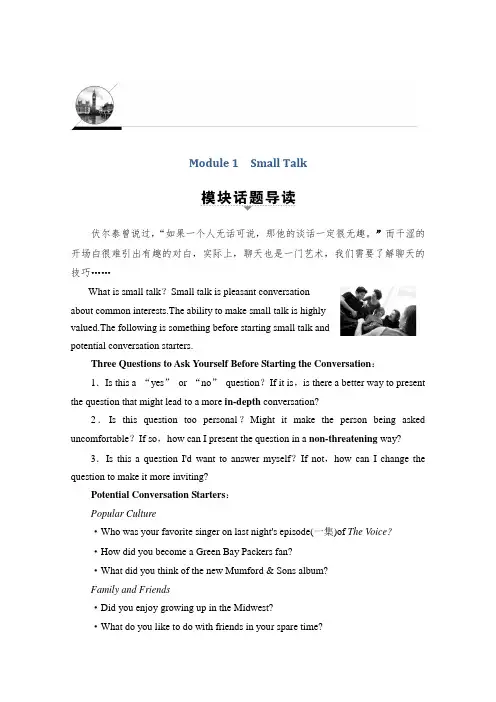
Module 1Small Talk伏尔泰曾说过,“如果一个人无话可说,那他的谈话一定很无趣。
”而干涩的开场白很难引出有趣的对白,实际上,聊天也是一门艺术,我们需要了解聊天的技巧……What is small talk?Small talk is pleasant conversationabout common interests.The ability to make small talk is highlyvalued.The following is something before starting small talk andpotential conversation starters.Three Questions to Ask Yourself Before Starting the Conversation:1.Is this a “yes”or “no”question?If it is,is there a better way to present the question that might lead to a more in-depth conversation?2.Is this question too personal?Might it make the person being asked uncomfortable?If so,how can I present the question in a non-threatening way?3.Is this a question I'd want to answer myself?If not,how can I change thequestion to make it more inviting?Potential Conversation Starters:Popular Culture·Who was your favorite singer on last night's episode(一集)of The Voice?·How did you become a Green Bay Packers fan?·What did you think of the new Mumford & Sons album?Family and Friends·Did you enjoy growing up in the Midwest?·What do you like to do with friends in your spare time?·Do you have to travel far to visit your brothers or sisters?Free Time and Hobbies·What made you decide to run for Vice president of the Education Club?·How long have you been playing golf?·Do you have any plans for Winter Break?Shared Interests·What did you think of our math test last Friday?·I heard that we're both attending the cooking class on Thursday.What's your favorite thing to make?Upcoming E v ents·Who do you think will win the Emmy for Best Supporting Actress?·What are you planning to dress up as for the office Halloween party this year?1.potential adj.潜在的,可能的2.in-depth adj.深入的3.non-threatening adj无威胁性的4.run for 竞选5.dress up as 打扮为1.What is small talk?2.How do you start small talk?【答案】 1.Small talk is pleasant conversation about common interests.2.We can start small talk in many ways,such as,popular culture,family and friends,free time and hobbies,shared interests,upcoming events and so on. Section ⅠIntroduction & Vocabulary andReading -Preparing根据所给词性和汉语提示写出下列单词1.adj.非正式的2.adj.严肃的3.ad v. 自信地4.v. 缺少,缺乏5.adj.预先的,在前的6.v. 点头7.v. 叹气,叹息8.n. 机会【答案】 rmal 2.serious 3.confidently4.lack 5.advance 6.nod7.sigh8.opportunity根据提示补全下列短语1.make 交朋友,建立友谊2.(be)nervous 对……神经紧张/害怕/胆怯/焦虑不安3.think 想起,回忆起4.body 身体语言,肢体语言5.look away 把目光从……移开6.rules 社交规则7.addition 除此以外,另外8.find 了解(到);找出(信息)【答案】 1.friends 2.about 3.of nguage 5.from 6.social7.in 8.out根据提示补全下列教材原句1.And they .而且这些技巧学起来也很容易。
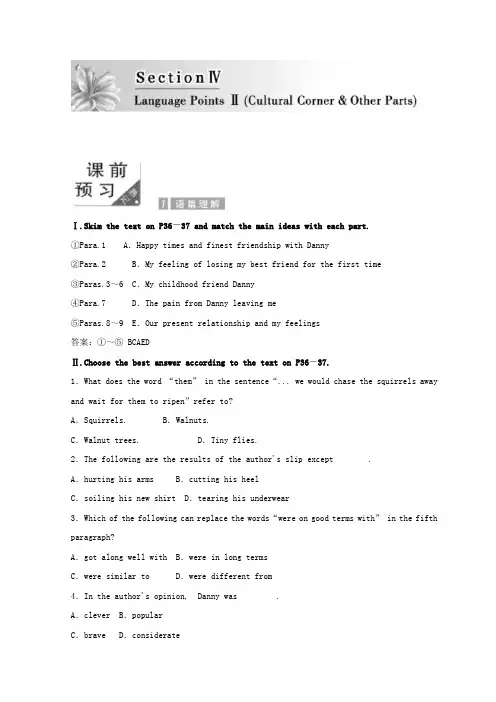
Ⅰ.Skim the text on P36-37 and match the main ideas with each part.①Para.1 A.Happy times and finest friendship with Danny②Para.2 B.My feeling of losing my best friend for the first time③Paras.3~6 C.My childhood friend Danny④Para.7 D.The pain from Danny leaving me⑤Paras.8~9 E.Our present relationship and my feelings答案:①~⑤ BCAEDⅡ.Choose the best answer according to the text on P36-37.1.What does the word “them” in the sentence“... we would chase the squirrels away and wait fo r them to ripen”refer to?A.Squirrels. B.Walnuts.C.Walnut trees. D.Tiny flies.2.The following are the results of the author's slip except .A.hurting his arms B.cutting his heelC.soiling his new shirt D.tearing his underwear3.Which of the following can replace the words“were on good terms with” in the fifth paragraph?A.got along well with B.were in long termsC.were similar to D.were different from4.In the author's opinion, Danny was .A.clever B.popularC.brave D.considerate答案:1~4 BCADⅠ.单词拼写1.All her classmates think she is an intelligent and lively(活泼的) girl.2.After the wheat harvest (收获), the peasants began to prepare seed corn. 3.Helen finally forgave (原谅) me for breaking the promise, which moved me very much. 4.At the end of the meeting, the manager mentioned (提到) the problem once again and asked us to solve it before Friday.5.Though you are the mayor, you don't have the privilege(特权) to do whatever you like. 6.Confronted (面对) with the difficulties in his research, Robert didn't lose heart. 7.She put the money in her bag without counting (数) it.8.The president said that his country deeply regretted (后悔) the incident.9.She realized that one of her friends must have betrayed (背叛) her.10.Don't scold (责备) him any longer; he is a mere child.11.He is suffering from acute (剧烈的) pain.12.Caroline tore (撕开) the envelope open to see what was inside.Ⅱ.拓展词汇1.considerate adj.体贴的,考虑周到的→consider vt.考虑→considering prep.鉴于→consideration n.考虑2.loss n.损失→lose v.失去,丢失3.regret v.& n.后悔,悔恨→regretful adj.懊悔的,惋惜的;遗憾的→regretfully adv.懊悔地,惋惜地;很遗憾地,抱歉地4.ripen vt.成熟→ripe adj.成熟的5.stony adj.石头的→stone n.石头6.predict v.预言,预测→prediction n.预言,预测7.liar n.撒谎者→lie v.撒谎8.reunite v.再次联合;重聚→unite v.联合,结合[巧记单词]Ⅲ.补全短语1.on the phone 在通电话2.make up 和好,和解3.keep in touch 保持联系4.lose touch with 与……失去联系5.(be) ashamed of 对……感到惭愧/羞耻6.(be) blessed with 享有……的福气7.(be) on good terms with 与某人关系很好8.all at once 突然9.bring ... to mind 使……想起;想起10.in return 作为交换11.belong to 属于12.from the bottom of one's heart 真心实意地,发自内心地1.[教材原句]I was blessed with a happy childhood, one that most people would want to have.我非常幸运地拥有一个幸福的童年,一段大多数人都希望拥有的时光。
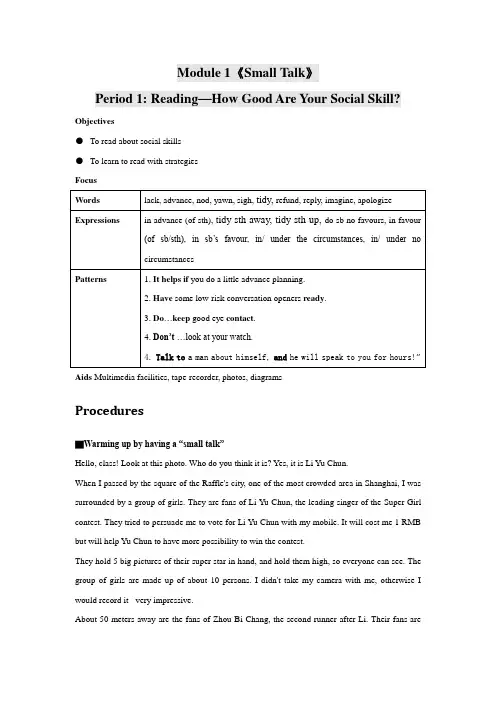
Module 1《Small Talk》Period 1: Reading—How Good Are Your Social Skill? Objectives●To read about social skills●To learn to read with strategiesFocusAids Multimedia facilities, tape-recorder, photos, diagramsProcedures▇Warming up by having a “small talk”Hello, class! Look at this photo. Who do you think it is? Yes, it is Li Yu Chun.When I passed by the square of the Raffle's city, one of the most crowded area in Shanghai, I was surrounded by a group of girls. They are fans of Li Yu Chun, the leading singer of the Super Girl contest. They tried to persuade me to vote for Li Yu Chun with my mobile. It will cost me 1 RMB but will help Yu Chun to have more possibility to win the contest.They hold 5 big pictures of their super star in hand, and hold them high, so everyone can see. The group of girls are made up of about 10 persons. I didn't take my camera with me, otherwise I would record it - very impressive.About 50 meters away are the fans of Zhou Bi Chang, the second runner after Li. Their fans aredoing the same. The hot compon has urged many fans go to the street and ask people passing by to send SMS for their supported girl.Last week, Li Yu Chun got 1.8 million SMS support from every corner of the country. I get this week, this number may double since it is the final and 2 more left the game and there is only 3 persons in the show. Last week, Li Yu Chun helped China Mobile, SP and Hunan TV to win almost 2 million RMB from SMS only. That is amazing.It's just like a president election. Super Girl is a vivid marketing, planning case study for business persons around the country.By the way, what I talk to you just now is an example of “small talk”. Let’s turn to page 1 to learn more about it.■Discussing how to make small talkSmall talk can be a big challenge, but a little preparation and confidence is all you need.★Steps:1. Practice. Converse with everyone you come across: cashiers, waiters, people you're in line with, neighbors, co-workers and kids. Chat with folks unlike yourself, from seniors to teens to tourists.2. Read everything: cookbooks, newspapers, magazines, reviews, product inserts, maps, signs and catalogs. Everything is a source of information that can be discussed.3. Force yourself to get into small talk situations, like doctors' waiting rooms, cocktail parties and office meetings. Accept invitations, or host your own gathering.4. Immerse yourself in culture, both high and low. Television, music, sports, fashion, art and poetry are great sources of chat. If you can't stand Shakespeare, that too is a good topic for talk.5. Keep a journal. Write down funny stories you hear, beautiful things you see, quotes,observations, shopping lists and calls you made. That story of the long-distance operator misunderstanding you could become an opening line.6. Talk to yourself in the mirror. Make a random list of topics and see what you have to say on the subjects. Baseball, Russia, butter, hip-hop, shoes ... the more varied your list, the better.7. Expand your horizons. Go home a new way. Try sushi. Play pinball. Go online. Paint a watercolor. Bake a pie. Try something new every day.8. Be a better listener. Did your boss just say she suffers from migraines? Did your doctor just have twins? These are opportunities for making small talk.9. Work on confidence, overcoming shyness and any feelings of stage fright. Remember, the more you know, the more you know you can talk about.★Tips:﹡Be yourself. Keep in mind that confidence and humor are superb substitutes for comedic genius or wit.﹡Remember, you never have to do it alone.﹡Keep a few exit lines in mind too. For example, "Thanks for the wonderful chat, but I must make believe I'm interested in everybody else. Tee hee."▇Before you readWe have come to page 2 to read the text How Good Are Your Social Skill? But first please go over the word list for this module, paying attention to the pronunciation of the word, the relationship between its pronunciation and its spelling.▇While you readNow the text. While reading try to cut/ the sentences into thought groups, blacken the predicates, underline the useful expressions and darken the connectives.▇After you readTry to find time to copy all the useful expressions into your Expression Book and make your own sentences with them.■Reading the text again to fill in the necessary information■Closing down by practicing small talksSmall Talk: Conversation StartersTalking about the weather •Beautiful day, isn't it?•Can you believe all of this rain we've been having? •It looks like it's going to snow.•It sure would be nice to be in Hawaii right about now.•I hear they're calling for thunderstorms all weekend. •We couldn't ask for a nicer day, could we?•How about this weather?•Did you order this sunshine?Talking about current events •Did you catch the news today?•Did you hear about that fire on Fourth St?•What do you think about this transit strike?•I read in the paper today that the Sears Mall is closing.•I heard on the radio today that they are finally going to start building the new bridge.•How about those Reds? Do you think they're going to win tonight?At the office•Looking forward to the weekend?•Have you worked here long?•I can't believe how busy/quiet we are today, can you?•Has it been a long week?•You look like you could use a cup of coffee.•What do you think of the new computers?At a social event •So, how do you know Justin?•Have you tried the cabbage rolls that Sandy made?•Are you enjoying yourself?•It looks like you could use another drink.•Pretty nice place, huh?•I love your dress. Can I ask where you got it?Out for a walk•How old's your baby?•What's your puppy's name?•The tulips are sure beautiful at this time of year, aren't they.•How do you like the new park?•Nice day to be outside, isn't it?Waiting somewhere●I didn't think it would be so busy today.●You look like you've got your hands full (with children orgoods).●The bus must be running late today.●It looks like we are going to be here a while, huh?●I'll have to remember not to come here on Mondays.●How long have you been waiting?。
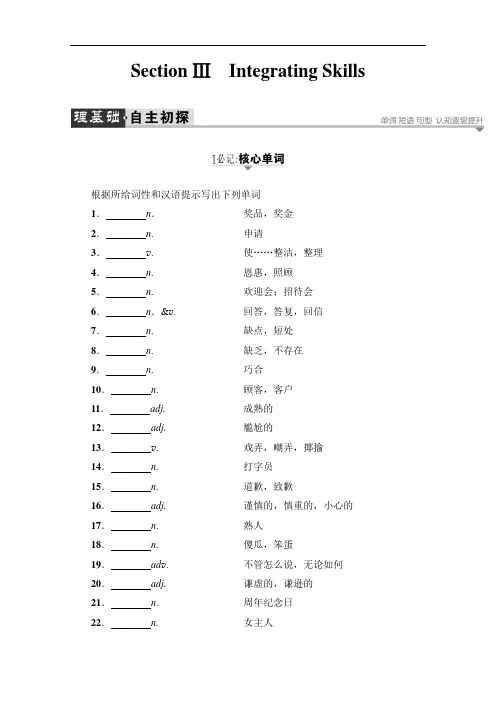
Section ⅢIntegrating Skills根据所给词性和汉语提示写出下列单词1.n.奖品,奖金2.n. 申请3.v. 使……整洁,整理4.n. 恩惠,照顾5.n. 欢迎会;招待会6.n.&v. 回答,答复,回信7.n. 缺点,短处8.n. 缺乏,不存在9.n. 巧合10.n. 顾客,客户11.adj.成熟的12.adj.尴尬的13.v. 戏弄,嘲弄,揶揄14.n. 打字员15.n. 道歉,致歉16.adj.谨慎的,慎重的,小心的17.n. 熟人18.n. 傻瓜,笨蛋19.ad v. 不管怎么说,无论如何20.adj.谦虚的,谦逊的21.n. 周年纪念日22.n. 女主人23.v. 打断24.n. 职员,办事员25.v. 解释,给……下定义26.v. 骚扰,妨碍,侵犯27.adj.成功的28.v. 想象29.n. 目的30.n. 情形,情况【答案】 1.prize 2.application 3.tidy 4.favour 5.reception 6.reply 7.shortcoming8.absence 9.coincidence10.customer11.mature12.awkward 13.tease14.typist15.apology16.cautious17.acquaintance18.fool 19.anyhow 20.modest21.anniversary22.hostess23.interrupt24.clerk 25.define26.violate27.successful28.imagine29.purpose30.circumstance根据提示补全下列短语1.show 炫耀2.as consequence 因此,结果3.cheer sb. 使人高兴/振作起来4.leave 省去,删去5.do sb. a 帮某个人的忙6.be cautious 对……小心谨慎7.(be)aware 知道8.go 经历,经受【答案】 1.off 2.a 3.up 4.out 5.favour6.about7.of8.through根据提示补全下列教材原句1.Her motto was“I open my mouth,I put my foot in it.”她的“座右铭”是“每当我开口,就会讲错话”。
Ⅰ.Match the word with its meaning.1.informal A.机会2.serious B.叹气,叹息3.confidently C.缺乏,缺少4.lack D.打呵欠5.advance E.非正式的6.nod F.预先的,在前的7.yawn G.严肃的8.sigh H.自信地9.opportunity I.点头10.obligation J.责任;义务答案:1~5 EGHCF 6~10 IDBAJⅡ.Write down the meaning of phrases in each sentence.1.All the students don't need to be nervous about the coming final exams. 对……紧张2.Can anybody think of a way to raise money? 想出3.You need money and time. In addition, you need diligence. 此外4.Look away from the tragic scene, or you will be frightened. 把目光从……移开5.We shall find out the truth early or late. 了解到6.He doesn't like making friends, so he always feels lonely. 交朋友1.Which topic do you become interested in, small talk or serious talk?Small talk.2.Try to classify the following into two columns.ⅠRead the text quickly and match the main idea with each part.①Part 1 (paras. 1~3) A.Developing your listening skills②Part 2 (para. 4) B.The introduction of the main idea of the passage③Part 3 (paras. 5~8) C.Learn how to do small talk④Part 4 (para. 9) D.Learn the rules答案:①~④ BCADⅡRead the text carefully and choose the best answer.1.The purpose of the passage is to .A.show us what small talk isB.help us deal with social eventsC.tell us something interesting about social rulesD.introduce different cultures of different countries2.How can you develop your listening skills?A.By changing the subject.B.By thinking of a recent news story.C.By looking away from the person you are talking with.D.By using positive language to show you are listening.3.What can we learn from what Benjamin Disraeli says?A.When talking with each other, never talk about the other.B.When talking with each other, talk more about other people.C.Talking more about the other person helps make a good conversation.D.Talking more about yourself will impress others in the conversation.4.We can infer from the passage that .A.people with good social skills can communicate wellB.keeping good eye contact shows you are a good listenerC.for small talk, you'd better have some lowrisk openers readyD.social skills are important for improving the interpersonal relationship答案:1~4 BDCDⅢAnalyze the following difficult sentences in the text.1.Listening is a skill which most people lack, but communication is a twoway process — it involves speaking AND listening.[句式分析] 并列连词but连接两个并列句,第一分句中关系代词which引导定语从句,which most people lack修饰先行词skill;第二分句中it involves speaking AND listening对上文补充说明。
[语法初识]
[语法剖析]
1.用作实义动词
(1) 有人称和数的变化,其第三人称单数形式为needs,变为否定句或疑问句时要用助动词do/does/did。
(2)后跟名词、代词、不定式或动名词作宾语,当need的主语与need后面的动词之间是被动关系时,need后面接不定式的被动形式或动名词的主动形式。
You don't need to worry about me.
你不必担心我。
The room needs cleaning/to be cleaned, but I only have time on Sunday.
房间需要打扫,但是我只有星期天有空。
2.用作情态动词
(1)need表示“需要”或“必须”,通常用于否定句和疑问句。
You needn't do it again.
你不必再做了。
Need he do his homework first?
他需要先做作业吗?
(2)由must引起的一般疑问句中,否定答语可用needn't, 意为“没必要”。
—Must I do the work now?
—No, you needn't.
——我现在必须做这项工作吗?
——不,你不必。
(3)在need引起的一般疑问句中,肯定回答用must,否定回答用needn't。
—Need I go there too?
—Yes, you must./No, you needn't.
——我也需要去那儿吗?
——是的,你必须去。
/不,你不必去。
集中演练1
1-1.单句改错
①—I'm sorry I will be very busy tomorrow.
—If so, you didn't need to come.didn't need to→needn't
②As a result of the serious flood, two thirds of the buildings in the area need repair.repair→repairing/to be repaired
③—Must I hand in the paper before Friday?
—No, you mustn't.mustn't→needn't
④I couldn't use a clock to wake me up every morning because I am always woken up by my mother.
couldn't→needn't
1-2.完成句子
⑤Dr. Smith needed (需要) no payment for his work.。